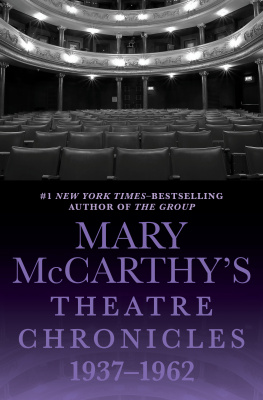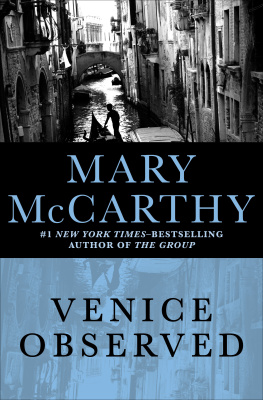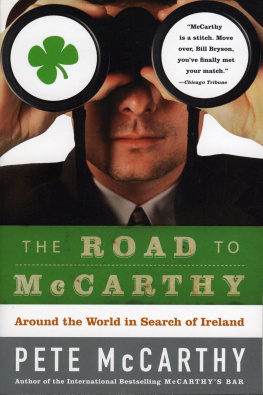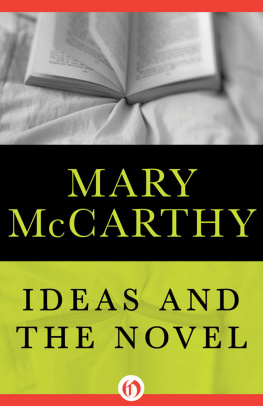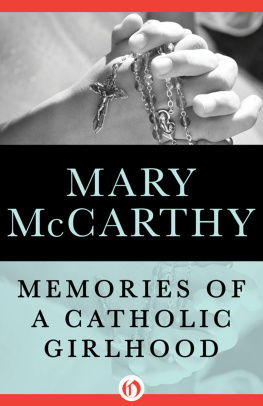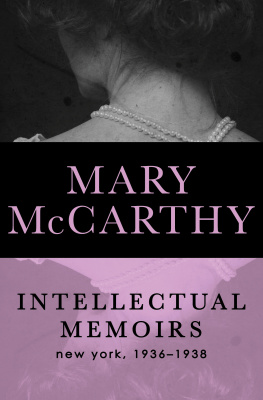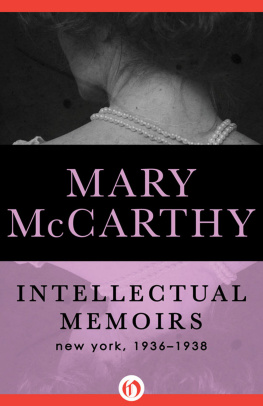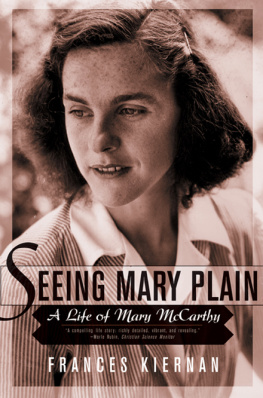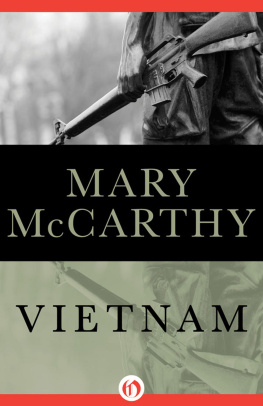
Library of America, a nonprofit organization,
champions our nations cultural heritage
by publishing Americas greatest writing in
authoritative new editions and providing resources
for readers to explore this rich, living legacy.
M ARY M C C ARTHY
NOVELS & STORIES 19421963
The Company She Keeps
The Oasis
The Groves of Academe
A Charmed Life
Stories
Thomas Mallon, editor

THE LIBRARY OF AMERICA
Volume compilation, notes, and chronology copyright 2017 by
Literary Classics of the United States, Inc., New York, N.Y.
All rights reserved.
No part of this book may be reproduced in any manner whatsoever without
the permission of the publisher, except in the case of brief
quotations embodied in critical articles and reviews.
The Company She Keeps copyright 1942 by Mary McCarthy, renewed
1970 by Mary McCarthy. The Groves of Academe copyright 1952 by
Mary McCarthy, renewed 1980 by Mary McCarthy. A Charmed Life
copyright 1955 by Mary McCarthy, renewed 1983 by Mary McCarthy.
The Weeds, The Friend of the Family, The Cicerone, The Old
Men, from Cast a Cold Eye copyright 1950 by Mary McCarthy,
renewed 1977 by Mary McCarthy. Published by arrangement with
Houghton Mifflin Harcourt Publishing Company.
The Oasis copyright 2013 by The Mary McCarthy Literary Trust.
Published by arrangement with Melville House Publishing, LLC.
The Company Is Not Responsible, The New Yorker, April 22, 1944,
copyright 1944 by Mary McCarthy. The Unspoiled Reaction, Atlantic
Monthly, March 1946, copyright 1946 by Mary McCarthy. The
Appalachian Revolution, The New Yorker, September 11, 1954, copyright
1954 by Mary McCarthy. The Hounds of Summer, The New Yorker,
September 14, 1963, copyright 1963 by Mary McCarthy.
Published by arrangement with The Mary McCarthy Literary Trust.
Distributed to the trade in the United States
by Penguin Random House Inc.
and in Canada by Penguin Random House Canada Ltd.
LIBRARY OF AMERICA, a nonprofit publisher, is dedicated to publishing, and keeping in print, authoritative editions of Americas best and most significant writing. Each year the Library adds new volumes to its collection of essential works by Americas foremost novelists, poets, essayists, journalists, and statesmen.
Visit our website at www.loa.org to find out more about Library of America
and to explore our popular Story of the Week and Moviegoer features.
Library of Congress Control Number: 2016946087
ISBN 9781598535167
eISBN 9781598535266
First Printing
The Library of America290
Manufactured in the United States of America
Mary McCarthy: Novels and Stories 19421963
is published with support from
a friend of
Library of America
Contents
THE COMPANY SHE KEEPS
CONTENTS
Foreword
Try to remember. When did you have it last? we say to that exasperating friend who opens her pocketbook and finds something missing, something ordinary and indispensable, glasses, a coin purse, a drivers license. If we are patient, we go over her day with herI know I had it on the bus because... Im sure I saw it when I paid my lunch check... If we are energetic, we accompany her while she retraces her steps, back to the stocking counter, the phone booth, the doctors office: we watch her day unroll before us, like a movie film that is run off backwards, where the diver floats up from the water and lands on the springboard.
When did you have it last? the author adjures the distracted heroine, who is fumbling in her spiritual pocketbook for a missing object, for the ordinary, indispensable self that has somehow got mislaid. It is a case of lost identity. The author and the reader together accompany the heroine back over her lifes itinerary, pausing occasionally to ask: Was it here? Did you still have it at this point? and suspecting, in spite of her protests, that perhaps she never took it with her at all when she started off in the morning.
It is not only scenes and persons but points of view that are revisitedthe intimate she, the affectionate, diminutive you, the thin, abstract, autobiographical I. If the reader is moved to ask: Can all this be the same person? why, that is the question that both the heroine and the author are up against. For the search is not conclusive: there is no deciding which of these personalities is the real one; the home address of the self, like that of the soul, is not to be found in the book.
M ARY M C C ARTHY
ONE
Cruel and Barbarous Treatment
S HE could not bear to hurt her husband. She impressed this on the Young Man, on her confidantes, and finally on her husband himself. The thought of Telling Him actually made her heart turn over in a sudden and sickening way, she said. This was true, and yet she knew that being a potential divorcee was deeply pleasurable in somewhat the same way that being an engaged girl had been. In both cases, there was at first a subterranean courtship, whose significance it was necessary to conceal from outside observers. The concealment of the original, premarital courtship had, however, been a mere superstitious gesture, briefly sustained. It had also been, on the whole, a private secretiveness, not a partnership of silence. One put ones family and ones friends off the track because one was still afraid that the affair might not come out right, might not lead in a clean, direct line to the altar. To confess ones aspirations might be, in the end, to publicize ones failure. Once a solid understanding had been reached, there followed a short intermission of ritual bashfulness, in which both parties awkwardly participated, and then came the Announcement.
But with the extramarital courtship, the deception was prolonged where it had been ephemeral, necessary where it had been frivolous, conspiratorial where it had been lonely. It was, in short, serious where it had been dilettantish. That it was accompanied by feelings of guilt, by sharp and genuine revulsions, only complicated and deepened its delights, by abrading the sensibilities, and by imposing a sense of outlawry and consequent mutual dependence upon the lovers. But what this interlude of deception gave her, above all, she recognized, was an opportunity, unparalleled in her experience, for exercising feelings of superiority over others. For her husband she had, she believed, only sympathy and compunction. She got no fun, she told the Young Man, out of putting horns on her darlings head, and never for a moment, she said, did he appear to her as the comic figure of the cuckolded husband that one saw on the stage. (The Young Man assured her that his own sentiments were equally delicate, that for the wronged man he felt the most profound respect, tinged with consideration.) It was as if by the mere act of betraying her husband, she had adequately bested him; it was supererogatory for her to gloat, and, if she gloated at all, it was over her fine restraint in not-gloating, over the integrity of her moral sense, which allowed her to preserve even while engaged in sinfulness the acute realization of sin and shame. Her overt superiority feelings she reserved for her friends. Lunches and teas, which had been time-killers, matters of routine, now became perilous and dramatic adventures. The Young Mans name was a bright, highly explosive ball which she bounced casually back and forth in these feminine



